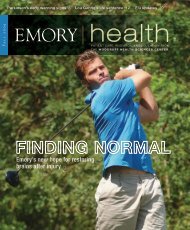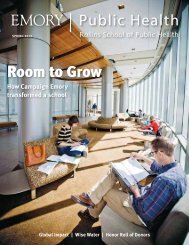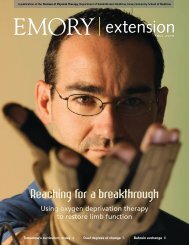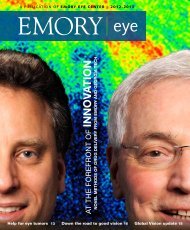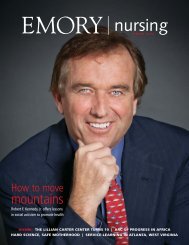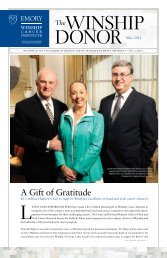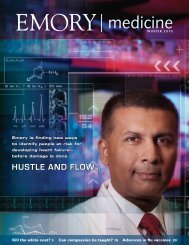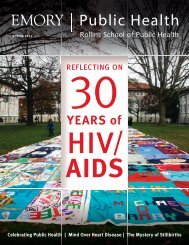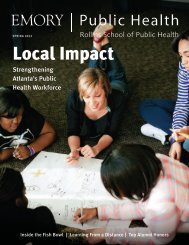returning quality to life - Woodruff Health Sciences Center - Emory ...
returning quality to life - Woodruff Health Sciences Center - Emory ...
returning quality to life - Woodruff Health Sciences Center - Emory ...
Create successful ePaper yourself
Turn your PDF publications into a flip-book with our unique Google optimized e-Paper software.
FROM THE CLASSROOM TO THE WORKFORCE<br />
Fulfilling work<br />
Before Zina Jenkins started her job at <strong>Emory</strong> University<br />
Hospital Mid<strong>to</strong>wn, IV pumps were always disappearing. Then<br />
Jenkins (below) entered the picture, tasked with rounding up<br />
the pumps, cleaning and testing them, then delivering them<br />
where they were needed. She became so adept at her job—<br />
and saved the hospital so much money—that <strong>Emory</strong> duplicated<br />
the job at <strong>Emory</strong> University Hospital.<br />
Jenkins is one of more than 40 young people with developmental<br />
disabilities working at <strong>Emory</strong> <strong>Health</strong>care. Trained<br />
through Project Search, they work between 20 and 30 hours<br />
a week on jobs from s<strong>to</strong>cking supply carts <strong>to</strong> compiling billing<br />
records. They are regular employees, earning regular wages.<br />
A collaboration between <strong>Emory</strong>, state agencies in Georgia,<br />
and the Roswell employment agency Briggs & Associates,<br />
Project Search targets high school<br />
seniors for one-on-one job training<br />
and coaching. As a sign of its<br />
success, the starting location for<br />
the program, <strong>Emory</strong> University<br />
Hospital Mid<strong>to</strong>wn, received the<br />
“Freedom <strong>to</strong> Compete” award in<br />
2007 from the Equal Employment<br />
Opportunity Commission.<br />
The program is a break from<br />
traditional approaches <strong>to</strong> employ-<br />
nity outreach, culminating in a health<br />
fair that they organize at their school.<br />
Pipeline participant Alexis Height, a<br />
junior, likes the interactive nature of the<br />
program. “I think we learn more from<br />
each other,” she says.<br />
Edward Anderson, a teacher who<br />
coordinates the program at South<br />
Atlanta High, reports an increase in<br />
the confidence and level of excitement<br />
among students about science. “We see<br />
more leadership, not just in class but in<br />
the whole building,” he says. “Students<br />
are picking up the <strong>to</strong>rch and running<br />
with it. I believe they will be future<br />
leaders and have a great impact.”<br />
Just how much impact the program<br />
is having will be verified soon by students<br />
at <strong>Emory</strong>’s Rollins School of Public<br />
<strong>Health</strong>. They are in the process of quantifying<br />
the effect of Pipeline on attendance,<br />
grades, and test scores.<br />
The first group <strong>to</strong> benefit from all<br />
three years in the Pipeline program<br />
has graduated recently, with all participants<br />
going on <strong>to</strong> enroll in a college<br />
or university. Several participants<br />
are studying in <strong>Emory</strong>’s Prepara<strong>to</strong>ry<br />
Research and Education Program (PREP)<br />
and Research Internships in Science<br />
and Engineering (RISE) program, and<br />
at least one South Atlanta student<br />
ment for people with developmental disabilities. It identifies<br />
clinical and clerical support staff positions and coaches the<br />
fit between the employee and the job, says Briggs Region<br />
Direc<strong>to</strong>r Emily Myers. “Once our individuals are hired, we<br />
don’t disappear. We do whatever it takes <strong>to</strong> keep them working.”<br />
That includes helping the employee with logistics and<br />
commuting challenges <strong>to</strong>o.<br />
Wesley Woods <strong>Center</strong> COO Al Blackwelder says that Project<br />
Search provides focused, energetic employees <strong>to</strong> do everyday<br />
tasks, freeing up health care staff <strong>to</strong> focus on patient care.<br />
Anne McKinnon, daughter of <strong>Emory</strong> vascular surgeon Bill<br />
McKinnon, was the first person hired by Project Search. An<br />
employee in patient accounts, she is known for being an avid<br />
Braves fan and has become a regular performer at <strong>Emory</strong><br />
Mid<strong>to</strong>wn’s annual talent show<br />
with her rendition of “Take me<br />
out <strong>to</strong> the ball game.”<br />
Another Search employee,<br />
Zelyna Cano, works in materials<br />
management, where she processes<br />
orders, handles bar codes,<br />
and makes deliveries. “I get <strong>to</strong><br />
move around,” Cano says. “I<br />
don’t sit in one place… and I like<br />
seeing the babies.” —QE<br />
QUINN EASTMAN<br />
was awarded a scholarship <strong>to</strong> <strong>Emory</strong>.<br />
Another Pipeline alumna, Alyssia Clore,<br />
earned a Gates Millennium scholarship,<br />
which is enabling her <strong>to</strong> attend Spelman<br />
College.<br />
“When you see kids who are the first<br />
in their families <strong>to</strong> go <strong>to</strong> college, or that<br />
didn’t think they were smart enough<br />
<strong>to</strong> go, those are the eye-openers that<br />
make this program worthwhile for me,”<br />
Anderson says. —QE<br />
WEB CONNECTION To see a video about<br />
Project Pipeline, visit http://bit.ly/emo-<br />
rypipeline.<br />
Winter 2011 15



